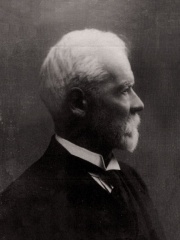
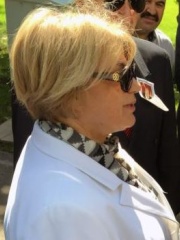
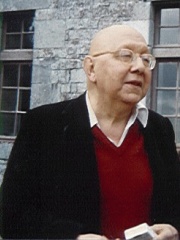
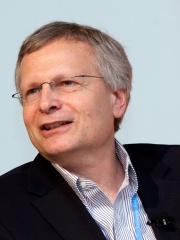
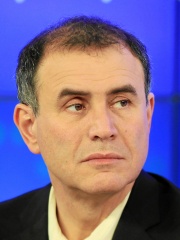
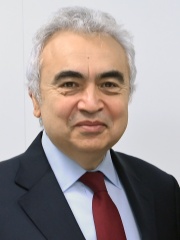
The Most Famous
ECONOMISTS from Türkiye
This page contains a list of the greatest Turkish Economists. The pantheon dataset contains 414 Economists, 7 of which were born in Türkiye. This makes Türkiye the birth place of the 11th most number of Economists behind India, and Austria.
Top 7
The following people are considered by Pantheon to be the most legendary Turkish Economists of all time. This list of famous Turkish Economists is sorted by HPI (Historical Popularity Index), a metric that aggregates information on a biography's online popularity.

1. Henri Fayol (1841 - 1925)
With an HPI of 73.33, Henri Fayol is the most famous Turkish Economist. His biography has been translated into 46 different languages on wikipedia.
Henri Fayol (29 July 1841 – 19 November 1925) was a French mining engineer, mining executive, author and director of mines who developed a general theory of business administration that is often called Fayolism. He and his colleagues developed this theory independently of scientific management. Like his contemporary Frederick Winslow Taylor, he is widely acknowledged as a founder of modern management methods.

2. Tansu Çiller (b. 1946)
With an HPI of 71.07, Tansu Çiller is the 2nd most famous Turkish Economist. Her biography has been translated into 73 different languages.
Tansu Çiller (Turkish: [ˈtɑnsu ˈtʃilːɛɾ]; born 24 May 1946) is a Turkish academic, economist, and politician who served as the 22nd prime minister of Turkey from 1993 to 1996. She is Turkey's only female prime minister. As the leader of the True Path Party, she went on to concurrently serve as Deputy Prime Minister of Turkey and as minister of foreign affairs between 1996 and 1997. As a professor of economics, Çiller was appointed Minister of State for the economy by Prime Minister Süleyman Demirel in 1991. When Demirel was elected as President in 1993, Çiller succeeded him as leader of the True Path Party and prime minister. Her premiership presided over the intensifying armed conflict between the Turkish Armed Forces and the PKK, resulting in Çiller's enacting numerous reforms to national defense. Her government was able to persuade the United States and the European Union to register the PKK as a terrorist organization. However, she was responsible for war crimes and crimes against humanity perpetrated against the Kurdish people by the Turkish military, security forces, and paramilitary. Shortly after winning the 1994 local elections, large-scale capital flight due to the lack of confidence in Çiller's budget deficit targets led to the Turkish lira and foreign currency reserves' almost collapsing. Amid the subsequent economic crisis and austerity measures, her government signed the EU-Turkey Customs Union in 1995. Her government was alleged to have supported the 1995 Azeri coup d'état attempt and presided over an escalation of tensions with Greece after claiming sovereignty over the Imia/Kardak islets. Although the DYP came third in the 1995 general election, she remained prime minister until she formed a coalition government with Necmettin Erbakan in 1996. The Susurluk scandal that year revealed the relations between extra-legal organisations and Çiller's government. Revelations that she had employed individuals connected with the Turkish mafia and the Grey Wolves such as Abdullah Çatlı led to a decline in her approval ratings. Erbakan's and Çiller's government fell when tensions with the military, concerned with civilians' lack of commitment to secularism, boiled over. This coup d'état by military memorandum was the fourth in the republic's history. DYP declined further in the 1999 general election. Despite coming third in the 2002 general election, Çiller's DYP won less than 10% of the vote and thus lost all parliamentary representation, which led to her resignation as party leader and departure from active politics.

3. Cornelius Castoriadis (1922 - 1997)
With an HPI of 68.61, Cornelius Castoriadis is the 3rd most famous Turkish Economist. His biography has been translated into 34 different languages.
Cornelius Castoriadis (Greek: Κορνήλιος Καστοριάδης; 11 March 1922 – 26 December 1997) was a Greek-French philosopher, sociologist, social critic, economist, psychoanalyst, author of The Imaginary Institution of Society, and co-founder of the Socialisme ou Barbarie group. His writings on autonomy and social institutions have been influential in both academic and activist circles.

4. Dani Rodrik (b. 1957)
With an HPI of 68.02, Dani Rodrik is the 4th most famous Turkish Economist. His biography has been translated into 90 different languages.
Dani Rodrik (born August 14, 1957) is a Turkish economist and Ford Foundation Professor of International Political Economy at the John F. Kennedy School of Government at Harvard University. He was formerly the Albert O. Hirschman Professor of the Social Sciences at the Institute for Advanced Study in Princeton, New Jersey. He has published widely in the areas of international economics, economic development, and political economy. The question of what constitutes good economic policy and why some governments are more successful than others at adopting it is at the center of his research. His works include Economics Rules: The Rights and Wrongs of the Dismal Science and The Globalization Paradox: Democracy and the Future of the World Economy.

5. Daron Acemoglu (b. 1967)
With an HPI of 66.80, Daron Acemoglu is the 5th most famous Turkish Economist. His biography has been translated into 45 different languages.
Kamer Daron Acemoğlu (born September 3, 1967) is a Turkish-American economist of Armenian descent who has taught at the Massachusetts Institute of Technology since 1993, where he is currently the Elizabeth and James Killian Professor of Economics, and was named an Institute Professor at MIT in 2019. His primary research fields include political economy, development economics, and labor economics. He received the John Bates Clark Medal in 2005, and the Nobel Prize in Economics in 2024. Acemoglu ranked third, behind Paul Krugman and Greg Mankiw, in the list of "Favorite Living Economists Under Age 60" in a 2011 survey among American economists. In 2015, he was named the most cited economist of the past 10 years per Research Papers in Economics (RePEc) data. According to the Open Syllabus Project, Acemoglu is the third most frequently cited author on college syllabi for economics courses after Mankiw and Krugman. In 2024, Acemoglu, Simon Johnson, and James A. Robinson were awarded the Nobel Memorial Prize in Economic Sciences for their comparative studies in prosperity between states and empires. He is regarded as a centrist with a focus on institutions, poverty and econometrics.

6. Nouriel Roubini (b. 1958)
With an HPI of 55.66, Nouriel Roubini is the 6th most famous Turkish Economist. His biography has been translated into 34 different languages.
Nouriel Roubini (Arabic: نوريل روبيني; born March 29, 1958) is an American economic consultant, economist, speaker, and writer. He is a professor emeritus since 2021 at the Stern School of Business of New York University. Roubini earned a BA in political economics at Bocconi University in Italy and a doctorate in international economics at Harvard University. He was an academic at Yale and a researcher/advisor researching emerging markets. During the Bill Clinton administration in the 1990s, Roubini was for one year a senior economist in the Council of Economic Advisers. He correctly predicted the subprime mortgage crisis and the ensuing Great Recession, and warned that the COVID-19 recession could be even worse. Roubini is also critic of Bitcoin and cryptocurrencies.

7. Fatih Birol (b. 1958)
With an HPI of 52.98, Fatih Birol is the 7th most famous Turkish Economist. His biography has been translated into 25 different languages.
Fatih Birol (born 22 March 1958) is a Turkish economist and energy expert, who has served as the executive director of the International Energy Agency (IEA) since 1 September 2015. During his time in charge of the IEA, he has taken a series of steps to modernise the Paris-based international organisation, including strengthening ties with emerging economies like India and China and stepping up work on the clean energy transition and international efforts to reach net zero emissions. Birol was on the Time 100 list of the world's most influential people in 2021, has been named by Forbes magazine among the most influential people on the world's energy scene and recognised by the Financial Times in 2017 as Energy Personality of the Year. Birol is the chairman of the World Economic Forum (Davos) Energy Advisory Board. He is a frequent contributor to print and electronic media and delivers numerous speeches each year at major international summits and conferences.
People
Pantheon has 7 people classified as Turkish economists born between 1841 and 1967. Of these 7, 5 (71.43%) of them are still alive today. The most famous living Turkish economists include Tansu Çiller, Dani Rodrik, and Daron Acemoglu. The most famous deceased Turkish economists include Henri Fayol, and Cornelius Castoriadis.
Living Turkish Economists
Go to all RankingsTansu Çiller
1946 - Present
HPI: 71.07
Dani Rodrik
1957 - Present
HPI: 68.02
Daron Acemoglu
1967 - Present
HPI: 66.80
Nouriel Roubini
1958 - Present
HPI: 55.66
Fatih Birol
1958 - Present
HPI: 52.98

